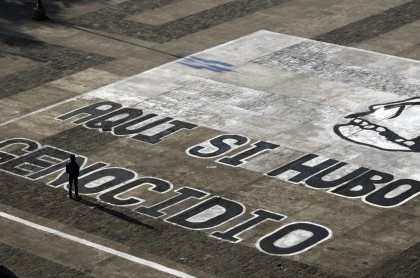Latin America
Related: About this forumWill Justice Be Possible In Guatemala?
Will Justice Be Possible In Guatemala?
The historic genocide trial of Efraín Ríos Montt was a huge step. But his conviction has been overturned—and many others have blood on their hands, including current president Otto Pérez Molina.
Frank Smyth
May 23, 2013
A partial retrial for 86-year-old ex-President Efraín Ríos Montt on charges of genocide and crimes against humanity now seems likely after Guatemala's top court this week overturned his historic May10 conviction on a technicality. Regardless of whether he is convicted again, other former military officers, who were even closer to the carnage against Ixil-speaking and other ethnic Mayans in Guatemala’s highland regions, remain at large.
One of them is Guatemala’s president, Otto Pérez Molina, a retired general who, according to an ex-soldier testifying in Ríos Montt’s trial, ordered soldiers to burn and loot villages and “execute people.” But President Pérez Molina was not on trial and no corroborating evidence against him was heard. (Pérez Molina denies any wrongdoing, or even that genocide in Guatemala ever took place.)
Such evidence exists, however. And there is more evidence still against other officers, particularly the tight-knit group who filled the chains of command during the genocide in the early 1980s, between then-Major Pérez Molina and then-President and General Ríos Montt.
Ríos Montt may yet become the first former head-of-state successfully prosecuted in his own nation for genocide. But this story doesn’t end with one facing an odd genocide trial and another president implicated in war crimes from thirty-odd years ago. A third Guatemalan president, Alfonso Portillo, faces trial in Manhattan on US money laundering charges, which were filed in 2010. Although they each served decades apart, and only two of them are former military officers, these three presidents have stories that are tightly interwoven. Much like the threads of an olive green military dress uniform, pulling too hard, now, at any one loose string, could start unraveling the fabric to eventually bare what lies beneath. This would also include the role of the United States in the violence in Guatemala.
More:
http://www.thenation.com/article/174433/will-justice-be-possible-guatemala#ixzz2UBCliPrL
Judi Lynn
(164,067 posts)24 May 2013 Last updated at 00:06 ET
Was there genocide in Guatemala?
By Will Grant
BBC News, Mexico City
Two names are synonymous with the violence of Guatemala's 36-year-long civil war. One is Dos Erres, a village in the jungle of the Peten region which was wiped from the face of the earth by soldiers in December 1982.
The other is Efrain Rios Montt, the de facto president and commander-in-chief of the armed forces at the time.
Today, the road to Dos Erres is long and riddled with potholes. But for our guide, Luis Saul Arevalo, known as Don Saul, it was a far more arduous journey. Don Saul is a survivor of the notorious massacre, and the trip to the place where his village once stood brought back some very traumatic memories.
He points out grisly signposts along the way - a parcel of land where his friends once lived, the place where the school used to be, or perhaps worst of all, the site of the village well, where the army dumped the mutilated bodies of their victims.
'Nothing'
Don Saul was just 25 when scores of troops came into his village. In three days of sustained torture, rape and murder the army killed at least 200 villagers. Among them were Saul's parents, his five younger brothers and sisters, and his three-year-old niece.
More:
http://www.bbc.co.uk/news/world-latin-america-22649355
Judi Lynn
(164,067 posts)[center] 


~~~~~~~
 [/center]
[/center]
Socialistlemur
(770 posts)I think he's going to get away with it. I'd try to prosecute him again, but lets face it he's likely to die soon. A better outcome is to build a very large memorial where the victims are named, and where the guilty are also listed. If their supporters want to take up a complaint in a civil case, the civil case is easy to win. The key isn't to deal with this guy as such, it's to let them know they'll be cast in bronze in a list of mass murderers preserved in history for future generations to understand what happened. it may not stop all future massacres, but it may give those who are inclined to do it a pause.
ocpagu
(1,954 posts)It was too depressing to read that Ríos Montt conviction had been overturned. Literally ruined my day. It's simply not acceptable to let anyone getting away with genocide. Just when I was thinking this was a good first step for more stable, stronger and fair Central American democracies...
Thanks for the thread, Judi.
